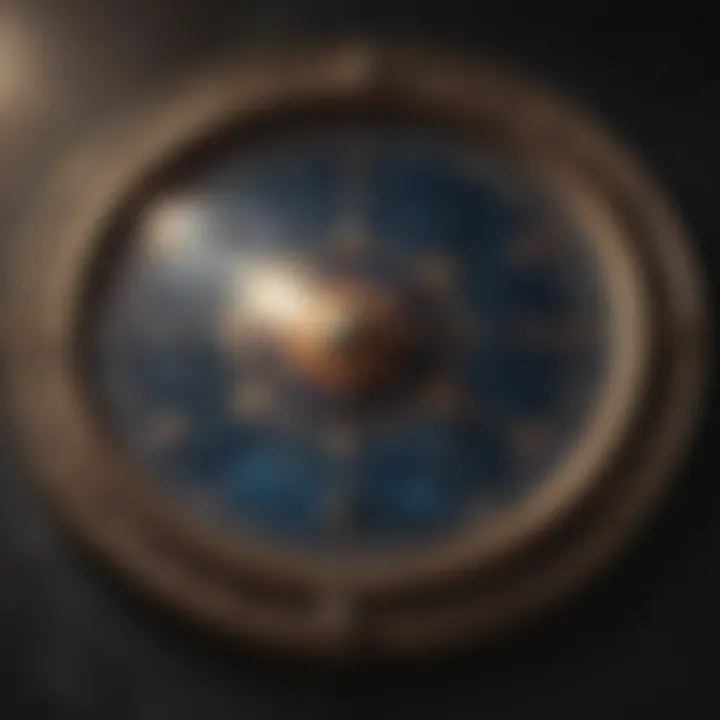Exploring Starsign Readings: Astrology's Insights


Intro
The world of astrology tends to stir a mix of skepticism and passion, exciting many yet leaving others scratching their heads. It’s like entering a vast library filled with secrets about oneself and the cosmic surroundings we inhabit. Central to this enigmatic field are starsign readings, considered a guiding light for countless seekers of self-awareness and connection.
In this exploration, we journey through the rich history and diverse methodologies that shape starsign readings. By weaving together theoretical concepts with tangible applications, we shed light on how understanding zodiac signs contributes not only to self-growth but also to enhancing relationships and making informed decisions in the whirlwind of life.
Each sign of the zodiac claims a distinct essence, holding keys that unlock layers of personality and potential. Whether it's the fierce determination of Aries or the empathetic nature of Pisces, knowing one’s starsign is just the beginning. Here, we'll delve deeper, illuminating what each sign represents, how they interact with each other, and the astral occurrences that can alter our paths.
So, fasten your seatbelts as we embark on this celestial voyage, navigating through the interactions between the cosmos and our personal realms.
Understanding Starsign Readings
Starsign readings hold various significance in astrology, serving as a guide for those seeking to understand their traits, behaviors, and destinies through celestial influences. By analyzing the arrangement of stars and planets at the moment of one's birth, astrology enthusiasts believe they can glean insights into personality traits and life paths. This is not merely a practice; it's an intricate art that connects individuals to a larger cosmic tapestry, engaging both the mind and spirit in a quest for deeper understanding.
The rationale behind starsign readings extends beyond mere entertainment. People often turn to astrology for personal guidance. Many see their zodiac signs as a compass that points towards self-improvement and decision-making that resonates with their inherent tendencies. Exploring your starsign may illuminate your strengths and weaknesses, offering potential pathways for personal development, enabling more fulfilling relationships, and improving life choices.
The Concept of Starsign Readings
Understanding the concept of starsign readings begins with the alignment of celestial bodies at the time of birth. Each individual's natal chart, or horoscope, reflects this unique arrangement. This chart includes not just the sun sign, often the most recognized aspect of astrology, but also the moon sign and rising sign, which alongside planetary placements, contribute to a more nuanced personality portrait.
The sun sign represents core identity and ego, the moon sign reveals emotional and instinctive reactions, and the rising sign indicates how one presents themselves to the world. Each component interplays with others, creating a rich tapestry of influence that can help paint a fuller picture of who a person truly is. With starsign readings, you're not just getting a snapshot of your personality; you're expanding your knowledge of how cosmic movements inform your life.
For many, diving into astrology prompts meaningful reflections that resonate at an emotional and psychological level. It encourages individuals to engage with their inner selves and potentially unearth aspects they were previously unaware of.
Historical Significance in Various Cultures
The historical roots of starsign readings unfold across a multitude of cultures and epochs. Ancient civilizations—from the Babylonians in Mesopotamia to the Greeks and Romans—cherished astrology as a vital tool for understanding the cosmos and its effect on human affairs. They believed that the movements of stars were not random but rather connected to human experiences on Earth.
- In Babylon, the earliest astrological records date back to around the second millennium BCE, where they devised a zodiac based on lunar cycles, making significant contributions to the astrological systems we see today.
- The Greeks further advanced astrology by assimilating Babylonian concepts and articulating them into a systematic philosophy that included personal interpretation and fate.
- Throughout the ages, cultures such as the Chinese, Hindu, and Mayan civilizations each developed unique astrological traditions that reflect their own cosmologies and observations of the night sky.
As a result, starsign readings have been universal in their appeal, adapted and interpreted through various lenses around the globe. This rich tapestry highlights how human beings have sought to connect with celestial phenomena, lending depth and meaning to their lives—hence, reinforcing astrology’s relevance even in modern times.
"The study of the stars isn't merely an ancient practice; it's a continual search for personal truth amidst chaos."
In summary, understanding starsign readings involves not just the mechanics of astrology but also a profound appreciation for its historical significance across cultures. Engaging with this ancient wisdom can provoke thought and inspire personal growth, allowing individuals today to navigate the complexities of life with insights gleaned from the stars.
The Zodiac: An Overview
The Zodiac serves as the cornerstone of astrology, unfolding a rich tapestry of human experience, emotions, and characteristics through twelve distinct signs. Each sign has its own unique traits, bringing forth an array of personalities that individuals identify with based on their birth dates. Understanding the Zodiac is essential for anyone looking to explore the intricate layers of human behavior and the cosmos' influence on our day-to-day lives.
Many a time, folks delve into astrology seeking clarity on personal dilemmas. What's remarkable about the Zodiac is its ability to offer insights into diverse areas, from career paths to relationship dynamics. By getting a grip on these signs, one can better navigate their personal landscape. The knowledge embedded within this framework is not merely academic; it’s deeply practical.
Twelve Zodiac Signs and Their Characteristics
Each zodiac sign, from Aries to Pisces, embodies a set of characteristics that can guide an individual’s understanding of their self and their interactions with others. For instance, the fiery nature of Aries often comes with enthusiasm and leadership, while the gentle allure of Pisces brings compassion and sensitivity. This leads to informed decision-making, where individuals can align their approaches to life in ways that resonate with their innate traits.
Some noteworthy personality traits include:
- Aries: Assertive, confident, ambitious
- Taurus: Reliable, patient, practical
- Gemini: Adaptable, curious, communicative
- Cancer: Nurturing, intuitive, protective
- Leo: Charismatic, generous, loyal
- Virgo: Analytical, meticulous, reserved
- Libra: Diplomatic, fair-minded, sociable
- Scorpio: Passionate, resourceful, determined
- Sagittarius: Adventurous, optimistic, freedom-loving
- Capricorn: Disciplined, goal-oriented, realistic
- Aquarius: Innovative, humanitarian, aloof
- Pisces: Imaginative, sensitive, retreating
Elements and Modalities in Astrology
Astrology isn’t just about signs; it also involves elements and modalities that add depth to the understanding of starsigns.
Fire, Earth, Air, Water
These elements categorize the signs into groups reflecting core aspects of human nature and experience:
- Fire: Fiery signs like Aries, Leo, and Sagittarius exude passion and enthusiasm. They are typically seen as natural initiators, embracing life's challenges head-on.
- Earth: Taurus, Virgo, and Capricorn embody practicality and stability. They often find value in tangible outcomes and grounded living, making them reliable and tactical.
- Air: Represented by Gemini, Libra, and Aquarius, these signs prioritize communication, ideas, and social connections. They're known for their intellect and the exchange of thoughts.
- Water: Cancer, Scorpio, and Pisces are deeply intuitive and emotional. They often tap into their inner selves and empathy, reflecting the complexities of human feelings.
This elemental division makes astrology more accessible to those exploring their identities and social interactions, providing classifications that resonate with human experiences.


"The elements and modalities in astrology knit together the tapestry of one's zodiac, portraying a more complex picture than what meets the eye."
Cardinal, Fixed, Mutable
Astrological modalities further define how the signs interact within the Zodiac:
- Cardinal signs: Aries, Cancer, Libra, and Capricorn are the initiators. Their desire to start new projects makes them pivotal in ushering change.
- Fixed signs: Taurus, Leo, Scorpio, and Aquarius are steadfast and prefer stability. Their loyalty and tenacity help sustain ideas and projects once they begin.
- Mutable signs: Gemini, Virgo, Sagittarius, and Pisces demonstrate adaptability. They are flexible and transition easily, allowing them to connect various perspectives.
This classification into modalities enriches one’s birth chart, providing a roadmap to understanding how best to navigate changes in life and situations.
Overall, recognizing the Zodiac’s fundamental framework creates a robust foundation for personal development and growth within the context of astrology.
Methodologies for Starsign Readings
Starsign readings serve as a guide through the complex tapestry of life. Understanding how to interpret these readings through various methodologies is crucial. Each technique offers distinct insights, allowing individuals to make informed decisions, deepen self-awareness, and navigate their relationships more effectively. This section dives into the prominent methods used for starsign readings, shedding light on their significance and applicability.
Natal Chart Analysis
Natal Chart Analysis is a cornerstone of astrological practice, capturing the celestial snapshot of a person's life at the moment of their birth. This methodology is incredibly valuable as it not only provides the context of the stars at one’s birth but also reveals personal traits, life challenges, and potential pathways.
The Importance of Birth Time
One key aspect of Natal Chart Analysis is the importance of birth time. The exact time of birth allows astrologers to plot the twelve houses of the natal chart accurately. Each house represents different aspects of life, from relationships to career choices.
Why is knowing the birth time critical? It offers a more nuanced understanding of one's unique chart. For example, two people born on the same day but at different times may exhibit vastly different personality traits and destinies due to the changing positions of celestial bodies.
The unique feature of this element is its precision. Without the birth time, a natal chart can lack depth, missing essential components that contribute to an accurate reading. The downside? Gathering the exact time can be problematic for some individuals. Yet, the effort pays off, laying a robust foundation for astrological exploration.
Interpreting Planetary Positions
Moving on, we find interpreting planetary positions to be another essential aspect of natal charts. Each planet represents different energies and influences, and their positions relative to one another tell a complex story about a person's psyche and life journey.
The key characteristic here is how planetary positions reveal potential strengths and weaknesses. For instance, a strong Venus might indicate a natural gift for relationships, whereas a troublesome Mars position could signal conflict tendencies.
A standout feature of interpreting planetary positions is its versatility—it can apply to various life events and personality traits. While this method is powerful, it does require a certain level of knowledge and practice. Newcomers might find it tempting to oversimplify these interpretations, missing the finer complexities.
Horoscopic Techniques
Horoscopic techniques expand upon natal charts to predict future events and trends, acting as a sort of celestial roadmap. These approaches are fundamental for those seeking ongoing guidance in their lives.
Transits and Progressions
Among horoscopic techniques, transits and progressions deserve a spotlight. Transits refer to how the current positions of the planets interact with the natal chart, while progressions offer a deeper, more personal lens by advancing the natal chart based on the individual's age.
This method shines through its ability to forecast significant life changes, allowing individuals to make proactive choices. For example, a transit of Jupiter may indicate a time of expansion or opportunities. The unique feature lies in its dynamic nature; unlike static natal charts, it reflects the ever-changing influences of the cosmos.
However, one must be cautious; over-relying on transits can lead to a sort of paralysis, where individuals wait for signs rather than taking decisive action.
Solar Return Charts
Another intriguing aspect is solar return charts, which create a new natal chart based on the exact time the Sun returns to its original position at one's birth. This chart is like a birthday reading, offering insights into themes for the upcoming year.
What’s beneficial about solar return charts is their targeted approach—they focus on one year at a time, providing a clear view of what to expect. The unique feature here is the predictability; this methodology can help in making plans for the year ahead based on astrological forecasts.
However, one downside is that solar return charts can be easily misunderstood. Without the proper context, the predictions can seem daunting or overly optimistic, leading to misinterpretations.
Synastry and Relationship Compatibility
Finally, we arrive at synastry, a practice focused on comparing two or more natal charts to determine compatibility. This method is significant for those looking to deepen their understanding of their relationships, whether romantic or platonic.
By examining how planetary positions interact, individuals can gain insights into each person’s strengths and challenges within the relationship framework.
Synastry offers a nuanced view, providing tools for navigating conflicts and enhancing bonds. The deep exploration of compatibility can lead to heightened awareness, enriching relationships where both parties can thrive. Yet, it should be noted that synastry doesn't dictate the success or failure of a relationship; rather, it highlights areas of synergy and challenge.


The methodologies outlined here open up realms of discovery, packing layers of meaning into the seemingly simple act of starsign readings. Understanding these methods can empower individuals to take charge of their lives, informed by celestial insights.
Practical Applications of Starsign Readings
Understanding starsign readings is more than just gazing at the night sky or musing over horoscopes in a magazine. It offers a practical toolkit for folks seeking clarity in their daily lives. These readings can help illuminate paths in personal decision-making, enhance emotional intelligence in relationships, and provide insights that can lead to personal growth.
Guidance in Personal Decision-Making
Starsign readings serve as a compass in the often turbulent waters of personal decision-making. Here, astrology steps in like an old friend, providing advice that echoes one's innate traits. When a person considers their starsign characteristics, it may reveal strengths or weaknesses they may not be fully aware of. This self-awareness can greatly influence how one approaches choices, whether it be career paths, lifestyle choices, or say, whether to take that leap into an entrepreneurial venture.
For example, a Leo, known for their boldness and leadership, might find affirmation in a reading that encourages them to take charge in a professional setting. In contrast, a Cancer may discover through their reading the importance of nurturing, prompting them to prioritize their well-being and relationships. This direct reflection of personal traits helps, making decision-making more aligned with intrinsic values.
Navigating Relationships through Astrology
Astrology often provides a unique lens to examine relationships. Starsign readings, when applied thoughtfully, can shed light on compatibility between partners, friends, and colleagues, helping to navigate the convolutions of emotional dynamics.
Compatibility Insights
When delving into compatibility insights, it's essential to note how the different traits of starsigns influence interactions. Each zodiac sign embodies specific characteristics that shape how individuals connect. For instance, a Sagittarius might approach problems with adventurous optimism, while a Taurus values stability and material comforts.
Understanding these contrasting traits allows individuals to appreciate their partners—recognizing that what might seem irritating can often be a reflection of their different starsigns.
The key characteristic of compatibility insights lies in fostering empathy. The unique feature of this approach is its ability to transform potential conflicts into opportunities for growth. However, a key point to remember is that these astrological readings should be viewed as guides, not as absolute truths. Misinterpretation could lead to unnecessary tension. Thus, thoughtful application is crucial.
Conflict Resolution Techniques
Astrology also offers an intriguing perspective on how to confront, resolve, and learn from conflicts. Conflict resolution techniques rooted in starsign readings encourage understanding differing personality styles. For instance, an Aries may prefer direct confrontation, while a Pisces might lean towards indirect, emotionally driven responses. Grasping these inclinations can aid partners in adjusting their communication styles effectively, minimizing misunderstandings.
The important feature of conflict resolution techniques based on starsigns is their focus on constructive outcomes. When one knows the nature of both parties involved, strategies for resolution can be tailored to respect boundaries and differences.
Nevertheless, it’s crucial to tread carefully. The potential for misuse lurks where individuals could mistakenly label behaviors based solely on starsigns. It's vital to remain aware of the broader human experiences beyond the celestial influences.
In summary, the practical applications of starsign readings can significantly influence personal and interpersonal dynamics. By using astrology as a tool for self-reflection and relation-building, individuals may navigate life's complexities with a bit more clarity and purpose.
Psychological Implications of Starsign Readings
Engaging with starsign readings can significantly impact individual psychology. It extends beyond merely predicting an individual's future; it taps into the core of self-perception and personal growth. The allure of astrology lies not just in foretelling fate but in painting a broader picture of how celestial bodies might shape our inner world. Through this lens, we can better understand behaviors, motivations, and emotional responses.
Self-awareness is often the first step in personal development. It’s like shining a spotlight on the areas of our life that remain in shadows. When individuals turn to astrology, they frequently seek clarity on personality traits and relationships. Starsign readings can serve as a mirror, reflecting back to us themes and archetypes we might not have acknowledged otherwise.
This can lead to a profound shift in how one views themselves and their circumstances, laying groundwork for transformative experiences. However, it is essential to approach such insights with a critical mind, recognizing the balance between belief and personal agency.
The Influence of Archetypes on Self-Perception
Archetypes are fundamental symbols or patterns that define human experiences. Within astrology, each zodiac sign embodies particular archtypes, impacting how individuals perceive themselves and interact with the world. For instance, someone under the influence of Aries may view themselves as a natural leader, driven and assertive, whereas a Pisces might resonate with traits of compassion and heightened emotional sensitivity.
"To know oneself is the beginning of all wisdom." – Aristotle
Such self-perceptions can bolster confidence or lead to identity conflict, depending on how closely an individual aligns with their assumed zodiac traits. When these archetypes resonate with someone's experience, it can lead to validation. Yet, if there’s a stark mismatch, it may invite introspection or even doubt about one’s capabilities or value.
It’s a dance of light and shadow – engaging with these archetypes gives us a framework to explore our identity while also prompting questions around authenticity.
Coping Mechanisms and Personal Growth
As individuals navigate life’s challenges, starsign readings often provide coping mechanisms tailored to their personality traits. For example, a Leo may find comfort in creative self-expression, while a Cancer might gravitate towards nurturing relationships for emotional support. Understanding these inclinations helps people navigate difficulties in ways that feel natural and affirming.
Moreover, astrology can encourage personal growth by illuminating blind spots. Recognizing a tendency toward stubbornness in a Taurus can open doors to develop flexibility in their approach to problem-solving.
Astrology also fosters a sense of community among individuals who share similar signs. This sense of belonging can be instrumental in coping during tough times, as it provides a network of understanding and shared experiences.
To summarize, while starsign readings are broader reflections of our lives, they possess genuine psychological implications that can enhance personal comprehension, coping strategies, and growth. By recognizing the nuances of these celestial insights, individuals may harness their power for better self-understanding and fulfilling journeys.
Astrological Folklore and Beliefs


Astrological folklore and beliefs hold a significant place in the landscape of astrology. They serve as a cultural bridge, connecting ancient wisdom to modern understanding. These stories and teachings not only provide context and meaning to the symbols found in starsign readings, but they also shape how individuals relate to their astrological identities. The nuances in these tales offer insights into the values, fears, and aspirations of different societies.
Cultural Variations in Astrology
One cannot overlook the diversity in astrological beliefs across various cultures. Each civilization has developed its own framework, painting its distinct picture of the cosmos. For instance, Western astrology, rooted in Hellenistic traditions, centers on zodiac signs and planetary movements. Meanwhile, Vedic astrology, also known as Jyotish, hails from ancient India and emphasizes the Moon's position and the Nakshatras. In cultures such as the Chinese, astrology revolves around the animal zodiac, with each year associated with a specific creature like the Rat or the Dragon, influencing personality traits and life events.
The beauty of these differences lies in their shared purpose: to offer insight into human nature and the unfolding of life’s mysteries. In the context of starsign readings, understanding these cultural variations can deepen an enthusiast's knowledge and expand their interpretative skills. The language employed in these traditions also offers a rich tapestry of metaphors and symbols, which astrological practitioners can draw from to enhance their readings.
Modern Interpretations and Adaptations
Today's practitioners often blend traditional astrological frameworks with modern psychology and personal development strategies. This fusion aims for a more holistic approach to starsign readings. With the rise of social media and digital platforms, astrology has seen a resurgence, particularly among younger generations.
Modern interpretations may focus on:
- Personal Empowerment: Using insights from starsign readings to navigate life's challenges more effectively.
- Inclusivity: Embracing non-binary and diverse representations within astrology, moving beyond the binary male-female notions traditionally held.
- Skeptical Engagement: Many individuals are approaching astrology with a blend of curiosity and critical thinking, acknowledging both the lore and its limitations.
"Astrology merges the art of storytelling with celestial mechanics, creating a narrative that resonates with us on a personal level."
Ultimately, these modern adaptations help astrology remain relevant, allowing it to adapt to the changing views of society while keeping its core beliefs intact. As more people explore their starsigns with an open mind, the layers of folklore and belief associated with astrology will continue to unfold, enriching the practice further.
Ethical Considerations in Starsign Readings
In the complex landscape of astrology, ethical considerations play a pivotal role in ensuring that starsign readings are both responsible and constructive. These readings can influence an individual's life, decision-making, and relationships. Hence, understanding the ethics behind these interpretations is paramount. Engaging in astrology isn't merely about reading the stars; it evokes deep personal reflections. Therefore, it’s critical to approach this discipline with consideration and care. This section covers two crucial themes: the responsibilities held by astrologers and the potential pitfalls of misuse.
The Role of Responsibility in Interpretation
Astrologers carry a significant weight on their shoulders when they interpret celestial charts and make predictions. Their insights can guide individuals in navigating life's hurdles or can inadvertently lead them down less favorable paths. Thus, a responsible interpretation embodies several components:
- Accuracy and Honesty: It’s essential for astrologers to convey interpretations with clarity, avoiding any embellishments that might mislead the client. Accurate communication ensures the individual understands the nuances of their reading.
- Respecting Boundaries: Recognizing the personal nature of astrological insights is vital. Astrologers must tread carefully, ensuring they don’t overstep personal boundaries or delve into sensitive topics without consent.
- Client Empowerment: Rather than dictating choices, astrologers should aim to empower their clients. By framing information to highlight strengths and potential action points, they can foster a sense of agency rather than dependence.
"Astrology does not dictate a person's path but rather presents a mirror reflecting possible influences. Understanding this difference is crucial for ethical practice."
By adhering to these principles, astrologers can advocate for responsible practices that benefit their clients and solidify a positive reputation for the practice.
Potential Misuse and Misinterpretation
Despite the noble intentions behind starsign readings, misuse and misinterpretations can lurk in the shadows. Here are key areas of concern:
- Manipulative Practices: A disreputable astrologer might cultivate dependency, exploiting individuals’ vulnerabilities for personal gain. This approach can lead to significant emotional distress and financial exploitation, tainting the integrity of astrology as a whole.
- Overgeneralization: Failing to personalize readings can result in vague advice that lacks relevance. A blanket statement may bring confusion or anxiety, causing individuals to misinterpret their own situations based on generalized traits of zodiac signs.
- Avoidance of Professional Help: Some individuals may place undue faith in astrology, neglecting to seek professional help for mental health or personal issues. This substitution can be dangerous, preventing them from receiving necessary support.
To mitigate these issues, both practitioners and seekers of starsign readings must engage in open dialogue about expectations, limitations, and ethical boundaries. Establishing a transparent relationship can notably reduce the risk of negative outcomes.
Resources for Further Exploration
Delving into the world of starsign readings is not merely an intellectual pursuit; it is a journey that invites individuals to explore deeper facets of their identity and relationships. Therefore, providing resources for further exploration becomes essential in reinforcing the concepts explored throughout this article. A well-rounded understanding of astrology encompasses both practical and theoretical knowledge, making additional reading and community engagement invaluable.
The benefit of utilizing these resources lies in their ability to bridge gaps between different interpretations and methodologies associated with astrology. By engaging with various platforms, one can enhance their comprehension while benefiting from diverse perspectives. From seasoned astrologers to those simply dipping their toe into celestial waters, there is something for everyone to glean.
Additionally, while starsigns can offer insights, understanding the nuances of astrological interpretations is key to personal growth. Researchers and practitioners have contributed numerous texts and articles, each bringing its own flavor to the age-old practice. Likewise, online communities serve as valuable spaces for discussions, allowing individuals to ask questions, share experiences, and build connections.
"Astrology is a reflection of the patterns found in nature, reflecting the variability of the human experience."
Ultimately, these resources empower readers to take charge of their astrology journey, providing opportunities for deeper inquiry, fostering a sense of community, and enriching their understanding of starsign significance in personal and relational contexts.
Books and Articles on Astrology
Several books have become cornerstones in the field of astrology, illuminating its principles and applications. Here are some notable titles that stand out:
- "The Only Astrology Book You'll Ever Need" by Joanna Martine Woolfolk
This book acts as a comprehensive guide for enthusiasts at all levels. It lays out zodiac characteristics in an accessible manner, making it easy to understand each sign's influence. - "Astrology for the Soul" by Jan Spiller
This book offers insights into the North Nodes of the Moon and how they relate to personal destiny, providing a unique approach to interpreting one’s starsign. - "Parker's Astrology: The Definitive Guide" by Julia and Derek Parker
A thorough exploration that combines both the basic tenets of astrology with more advanced concepts, suited for both novices and experienced astrologers.
In addition to books, numerous articles found in reputable journals and online platforms unfold a variety of astrological perspectives—helping readers understand both the theoretical and practical aspects of their starsigns and natal charts.
Online Platforms and Communities
The internet is a treasure trove of resources for anyone curious about astrology. Various platforms offer myriad ways to engage with the subject:
- Astro.com
Known for its accurate calculations and detailed birth chart interpretations, this site is a favorite among astrology enthusiasts. - Astrology Weekly
This site provides free resources, including articles, forums, and tools for chart calculation, making it perfect for newbies and experts alike. - Reddit (r/astrology)
A vibrant community where users discuss everything from charts to personal anecdotes, enriching collective wisdom and insights about how starsigns influence daily life. - Facebook Astrology Groups
Multiple groups exist on Facebook that cater to specific astrological interests—be it natal chart readings, predictive astrology, or compatibility discussions. Engaging on these platforms can yield valuable advice and friendships.
Each of these resources paves the way for a richer understanding of astrology, aiding individuals in navigating their personal experiences through the lens of starsign readings. By dedicating time to explore these avenues, you expand not just your knowledge, but also your sense of belonging within an astrological community.



